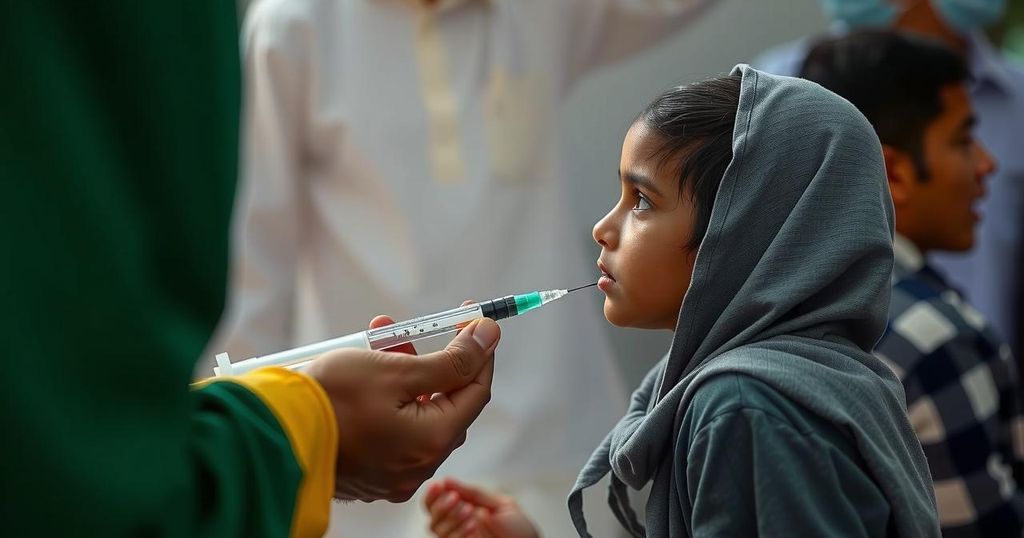Pakistan and Afghanistan have initiated new polio vaccination campaigns amid rising cases. The WHO reported 64 infections this year, with Pakistan contributing 41 and Afghanistan 23. The campaigns aim to vaccinate millions of children and respond to significant regional outbreaks, particularly in southwestern Pakistan. Vaccination efforts are hindered by misinformation and violence, necessitating collaborative strategies for successful eradication.
On Monday, Pakistan and Afghanistan initiated fresh polio vaccination campaigns as part of ongoing efforts to combat polio amid a worrying rise in cases within the two countries where the poliovirus is still endemic. In 2024, the World Health Organization (WHO) reported a total of 64 polio infections, with Pakistan accounting for 41 cases and Afghanistan for 23, significantly higher than the previous year’s figures of six per country. Pakistan’s campaign involves a weeklong nationwide endeavor, encompassing house-to-house vaccinations facilitated by 400,000 polio workers aimed at reaching over 45 million children under the age of five. Ayesha Raza Farooq, the Prime Minister’s advisor on polio eradication, emphasized that this is Pakistan’s third national campaign for 2024, triggered by an alarming rise in infections across 71 districts. A notable percentage of the current infections are concentrated in Balochistan province, which is experiencing intense transmission of the poliovirus. Additional cases have been recorded in Sindh and other regions. Anwarul Haq, the coordinator at the National Emergency Operations Center for Polio Eradication, urged community cooperation in safeguarding children from polio, emphasizing the absence of a cure for this debilitating illness. He called for united action to protect the nation’s youth through vaccination efforts. The resurgence of polio in Pakistan has been attributed to vaccine refusals in rural communities due to persistent misinformation that these health initiatives are part of a Western scheme aimed at sterilizing Muslim children. Furthermore, violence from anti-state militants targeting vaccination teams has led to tragic incidents, with several deaths reported among health workers and their security escorts this year. In Afghanistan, officials from the Taliban regime announced the commencement of a three-day vaccination campaign targeting 6.2 million children in 16 provinces, primarily near the Pakistani border. This campaign follows nearly two months of delays after house-to-house vaccination efforts were curtailed in Kandahar, where Taliban authorities expressed concerns regarding covert surveillance activities affecting their leadership’s security. Current efforts prioritize site-to-site and mosque-to-mosque vaccinations instead. WHO representatives have stated that effective polio eradication in Afghanistan necessitates the inclusion of large migrant populations and outreach efforts towards communities resistant to vaccination. Establishing a dedicated female public health workforce is also seen as vital to effectively address the multifaceted challenges facing vaccination in the country.
Polio, or poliomyelitis, is a highly infectious viral disease that primarily affects children, often resulting in paralysis. Pakistan and Afghanistan are the only countries in the world where polio remains endemic. The resurgence of polio cases can be largely attributed to vaccination hesitancy fueled by misinformation and extremist violence against health workers. Recent data has shown a troubling rise in polio infections, leading both nations to launch renewed vaccination initiatives in a bid to eradicate the disease.
In summary, as polio cases climb in Pakistan and Afghanistan, both nations have launched aggressive vaccination campaigns targeting millions of children to prevent the further spread of this debilitating disease. Despite significant efforts, challenges persist, including community resistance fueled by misinformation and violence against health workers. For successful eradication, comprehensive strategies must be employed, including outreach to hesitant populations and the integration of the female workforce in health initiatives.
Original Source: www.voanews.com






